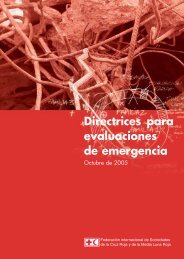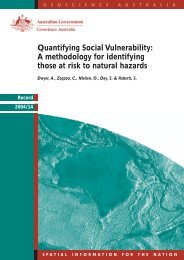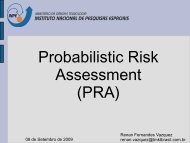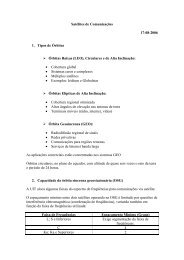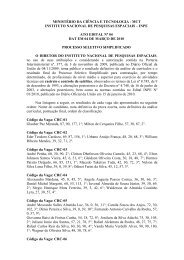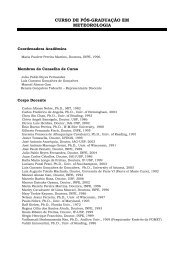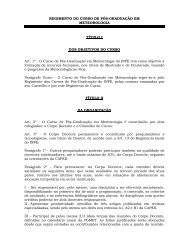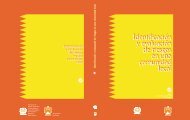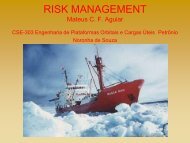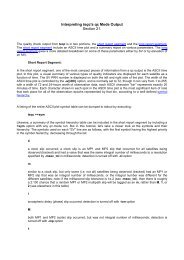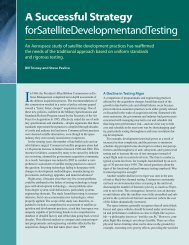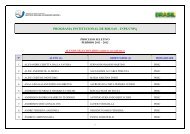Living with Risk. A global review of disaster reduction initiatives
Living with Risk. A global review of disaster reduction initiatives
Living with Risk. A global review of disaster reduction initiatives
Create successful ePaper yourself
Turn your PDF publications into a flip-book with our unique Google optimized e-Paper software.
ter. By working together <strong>with</strong> communities,<br />
CDRN has developed strategies to enhance<br />
people’s capacities through community organizing,<br />
forming village-level <strong>disaster</strong> response committees,<br />
developing local early warning systems,<br />
organizing rescue teams and diversifying local<br />
sources <strong>of</strong> livelihoods. Receiving little external<br />
support from donor agencies, it has reached<br />
hundreds <strong>of</strong> villages and initiated communitybased<br />
<strong>disaster</strong> mitigation <strong>initiatives</strong>.<br />
Case: Bangladesh<br />
To reduce the vulnerability <strong>of</strong> flood-prone communities<br />
in the Tongi and Gaibandha municipalities<br />
<strong>of</strong> Bangladesh, CARE Bangladesh has<br />
adopted a community-based approach working<br />
in collaboration <strong>with</strong> partner NGOs in the<br />
municipalities and <strong>with</strong> the Disaster Management<br />
Bureau <strong>of</strong> the Government <strong>of</strong> Bangladesh.<br />
This urban <strong>disaster</strong> mitigation project, funded<br />
by OFDA/USAID and managed by ADPC’s<br />
Asian Urban Disaster Mitigation Programme,<br />
began by motivating community volunteers to<br />
conduct baseline surveys and vulnerability<br />
assessments. Through this initial activity, different<br />
community groups recognized the importance<br />
<strong>of</strong> their joint community participation and<br />
how each could contribute to practical risk<br />
<strong>reduction</strong> activities. This project emphasized the<br />
importance <strong>of</strong> promoting hazard and risk<br />
awareness among community groups and<br />
sought to involve collaborators in other subject<br />
areas by placing community-based <strong>disaster</strong> risk<br />
management issues on the political agenda.<br />
Since 1998, in order to promote community<br />
awareness about the value <strong>of</strong> <strong>disaster</strong> risk <strong>reduction</strong>,<br />
the government <strong>of</strong> Bangladesh has designated<br />
the last working day <strong>of</strong> March as National<br />
Disaster Preparedness Day. In 2001, this<br />
national day was organized jointly by the Tongi<br />
and Gaibandha Municipality Disaster Management<br />
Committees, CARE Bangladesh and<br />
other partner NGOs.<br />
Case: Zimbabwe<br />
Policy and public commitment: the foundation <strong>of</strong> <strong>disaster</strong> risk <strong>reduction</strong><br />
strengthen drought mitigation in Zimbabwe.<br />
The current members, ENDA, ORAP,<br />
ZFFHC, World Vision and Zimbabwe Projects<br />
strive to implement joint communitybased<br />
risk <strong>reduction</strong> projects, conduct public<br />
debates on drought mitigation, and produce<br />
and distribute the <strong>Living</strong> <strong>with</strong> Drought newsletter.<br />
These efforts seek to share lessons that have<br />
been learned and recent scientific research<br />
results related to <strong>disaster</strong> <strong>reduction</strong>. Meetings<br />
are also convened between rural farmers, scientists<br />
and innovative farmers.<br />
A similar regional network is the anticipated<br />
Southern African Drought Technology Network. It<br />
will work to facilitate the sharing <strong>of</strong> information<br />
among small-scale farmers, NGOs and community-based<br />
organizations working <strong>with</strong> rural<br />
food security, agricultural research institutions,<br />
agricultural extension work, and agribusiness<br />
on drought-coping strategies that are responsive<br />
to the needs <strong>of</strong> the rural poor. Communitybased<br />
<strong>disaster</strong> risk <strong>reduction</strong> <strong>initiatives</strong> are well<br />
developed in Zimbabwe, but documentation <strong>of</strong><br />
successful practices must still be improved. It<br />
will be important to complement this <strong>with</strong> further<br />
research to feed into the national <strong>disaster</strong><br />
management plans and strategies.<br />
Case: Germany<br />
The Community Action Group for Floodwater in<br />
the Old Community <strong>of</strong> Rodenkirchen (Bürgerinitiative<br />
Hochwasser, Altgemeinde Rodenkirchen) is<br />
a non-pr<strong>of</strong>it association in a district <strong>of</strong><br />
Cologne, founded after the severe flooding <strong>of</strong><br />
the Rhine River in 1993 and 1995. This self-<br />
“We are convinced that protection against flooding can<br />
only be successful in the long-term if all inhabitants<br />
along the river perceive themselves as a community<br />
working in solidarity <strong>with</strong> each other. As we ourselves<br />
have experienced <strong>with</strong> our own considerable efforts and<br />
the many setbacks we have suffered, acting together<br />
does not come naturally but, rather, it is a product <strong>of</strong><br />
knowledge, experience and conviction, mediated<br />
through communication – and this is best achieved<br />
through personal contacts.”<br />
3<br />
The Community Drought Mitigation Partners’<br />
Network is an NGO network chaired by the<br />
local NGO SAFIRE and aims to promote and<br />
Speaker for Community Action Group for Floodwater in the<br />
Old Community <strong>of</strong> Rodenkirchen, Cologne, Germany<br />
145



